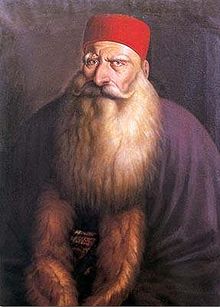Bashir Shihab II
This article needs additional citations for verification. (December 2009) |

Emir Bashir Shihab II (also spelt "Bachir Chehab II"; January 2, 1767[1] – 1850) was a Lebanese emir (prince) who ruled Lebanon in the first half of the 19th century.
Life
Bashir was born in Gazir, son of Emir Qasim ibn Umar Chehab[2] of the noble Chehab family which had came to power in 1697. Despite his noble roots he was born into poverty and married a rich cousin.
Career
In 1788, after abdication of his predecessor, Emir Yussef Chehab, he was elected an emir and would rule under Ottoman suzerainty, being appointed wali or governor of Mount Lebanon, the Beqaa Valley and Jabal Amel, together forming about two thirds of modern day Lebanon. He would reform taxes and attempt to break the feudal system, in order to undercut rivals, the most important of which was also named Bashir: Bashir Jumblatt, whose wealth and feudal backers equaled or exceeded Bashir II – and who had increasing support in the Druze community.
In 1799 Bashir refused to assist either Napoleon or al-Jazzar during Napoleon's -siege on Acre. This was one of the factors causing Napoleon's failure and eventual return to Egypt.
War
In 1822 the Ottoman wali of Damascus went to war with Acre, which was allied with Muhammad Ali, the pasha of Egypt. As part of this conflict one of the most remembered massacres of Maronite Christians by Druze forces occurred, forces that were aligned with the wali of Damascus. Jumblatt represented the increasingly disaffected Druze, who were both shut out from official power and angered at the growing ties with the Maronites by Bashir II, who was himself a Maronite Christian (initially the Chehab family was Sunni Muslim and some of which converted to Christianity at the end of the 18th century, under Bashir)
Rebellion
Bashir II was overthrown as Emir when he backed Acre, and fled to Egypt, later to return and organize an army. Jumblatt gathered the Druze factions, and the war became sectarian in character: the Maronites backing Bashir II, the Druze backing Bashir Jumblatt. Jumblatt declared a rebellion, and between 1821 and 1825 there were massacres and battles, with the Maronites attempting to gain control of Mount Lebanon, and the Druze gaining control over the Beqaa valley. In 1825 Bashir II defeated his rival and killed him after the battle of al-Simqaniya. Bashir II was not a forgiving man and repressed the Druze rebellion, particularly in and around Beirut.
Later Years
Bashir II, who had come to power through local politics and nearly fallen from power because of his increasing detachment from them, reached out for allies, allies who looked on the entire area as “the Orient” and who could provide trade, weapons and money, without requiring fealty and without, it seemed, being drawn into endless internal squabbles.
Trying to obtain greater degree of autonomy he supported Muhammad Ali's rise against the Ottoman Empire and allied with Ali's son Ibrahim Pasha who occupied Syria on his father's behalf.
This way United Kingdom's and Austrian interests were threatened, so in 1840 they both helped the Ottomans to drive Ibrahim Pasha from Syria. Bashir was captured and sent into exile to Malta then to Constantinopole, where he would later die.
For a short time the direct Ottoman rule over Lebanon was imposed until Bashir Chehab III, another member of the Chehab family, was appointed an emir.
Monuments
One of the most remarkable Bashir's monuments is a magnificent palace in Beit ed-Dine which he started building immediately after taking power in 1788. He moved his government from Deir al-Qamar to Beit ed-Dine when he had executed (as a part of his many Intrigues) a popular prince and caused riots in Deir al-Qamar.
Influence
Today, the Chehabs are still one of the prominent families in Lebanon and his direct descendants are currently residing in Turkey, France and U.K. known as Paksoy family.
